| Call Center Meaning: A call center is a centralized support team of customer service agents who answer and make calls for a company. They help customers with questions or problems, conduct sales calls, telemarketing, and more. |
When you call a company with a question or a problem, you’re most likely not going to reach someone in their main office. You’re likely talking to a call center agent if you speak with someone. But just what is a call center in today’s terms, and how do modern call centers work?
Call centers are cornerstones of customer service strategies. In this article, we’ll delve into the nuts and bolts of how call centers work and explore the differences between different types of call centers. If you’ve ever considered this solution for your business, you’re in luck. We also explore reasons why you might need a call center.
Let’s get started.
How Do Call Centers Work?
Call centers use teams of agents who handle incoming and outgoing calls. When a customer calls, an available agent assists the customer with their question or issue.
To improve efficiency, agents use different call center technology and scripts to guide them through the call and provide consistent service. This includes call routing systems that direct calls based on the caller’s needs and the agent’s availability. All these features help ensure that calls are answered promptly and by the most suitable agent.
When a customer calls your business:
- IVR prompts them with menu options.
- The system routes the customer to an agent.
- The agent identifies the customer and the problem.
- The agent solves the problem or finds the next steps.
- The agent records and documents the call.
- The agent follows up if needed.
Agents also use tools like interactive voice response (IVR) systems for call handling automations, like gathering information from callers before connecting them to an agent.
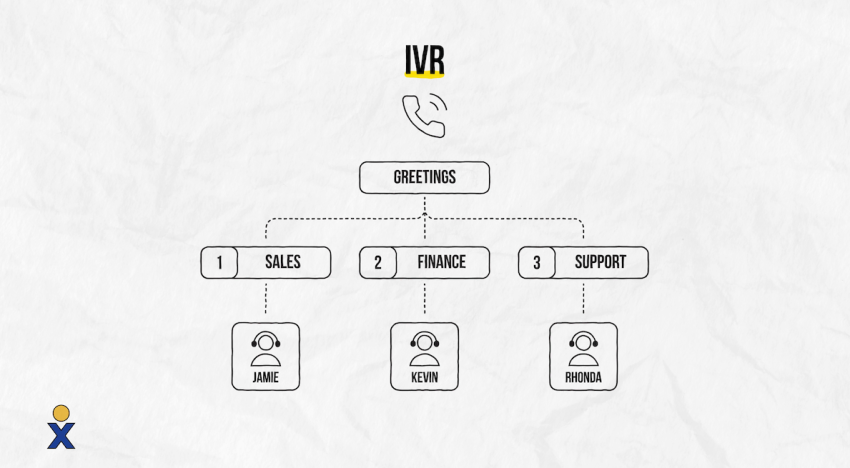
Overall, call centers are designed to handle a large volume of calls efficiently and provide a positive customer experience (CX). They are crucial for businesses to manage customer inquiries, provide support, and conduct sales and marketing activities over the phone.
Related: 16 Must-Have Call Center Features for Sales Teams
Types of Call Centers
With all the kinds of inquiries that callers can contact you about, call centers can’t operate as one-size-fits-all solutions. There are several different types of call centers to serve the specific needs of different kinds of businesses.
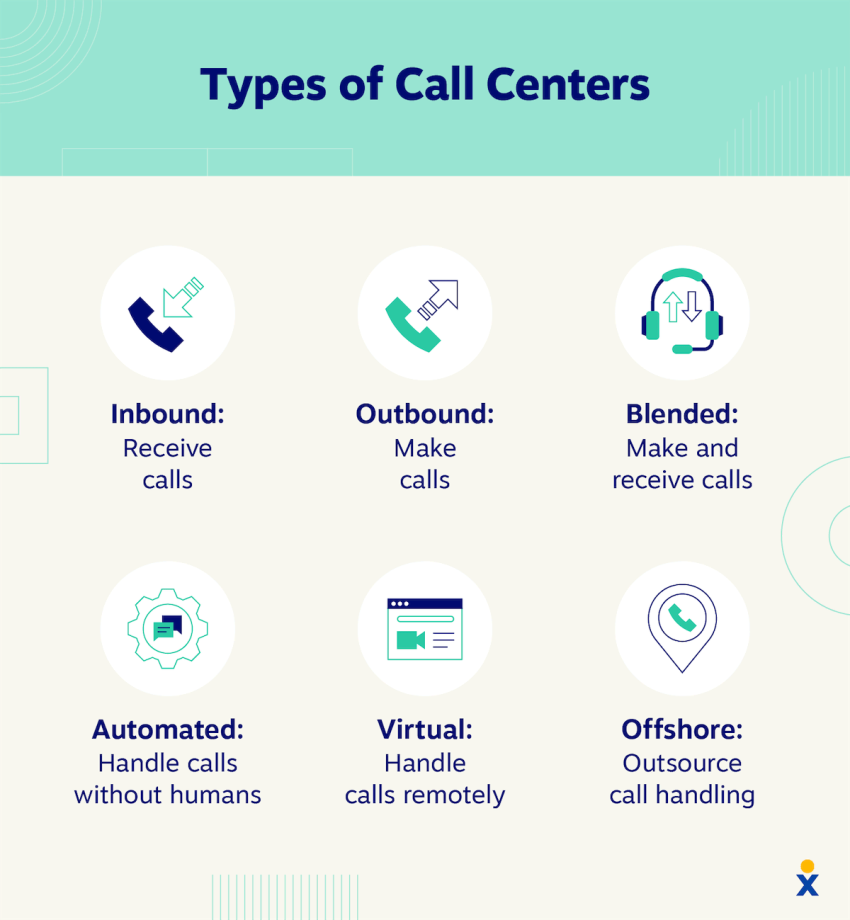
Inbound call center
⭐ Best for: Businesses with a high volume of customer inquiries or helpdesk needs.
Inbound call centers primarily receive calls from customers. Customer service representatives in inbound call centers are trained to handle all kinds of customer needs. They focus on providing high-quality service to resolve customer issues efficiently.
These calls can be:
- General inquiries
- Support requests
- Orders
- Feedback
These call centers focus on providing a personalized customer experience. Agents listen actively to customers, understand their needs, and provide tailored solutions. This personalized approach helps build customer loyalty and can lead to higher customer satisfaction levels than other call centers.
| 👀 In action: An e-commerce company experiencing a surge in customer inquiries during a sales event would use an inbound call center to handle the increased call volume and ensure timely customer support. |
Outbound call center
⭐ Best for: Businesses that rely on proactive customer engagement, like sales or market research firms.
Outbound call centers make proactive calls to customers or prospects. Outbound agents are trained to engage customers effectively over the phone and often use customer service scripts or call lists to guide their conversations.
These call centers are commonly used for:
- Telemarketing
- Sales
- Customer surveys
- Appointment reminders
Outbound call centers use automatic or predictive dialers. Auto dialers can dial numbers from a populated log, saving agents time. However, agents still need to spend time updating their lists manually to ensure they’re compliant with TCPA (Telephone Consumer Protection Act) and don’t include any callers who’ve opted out of contact.
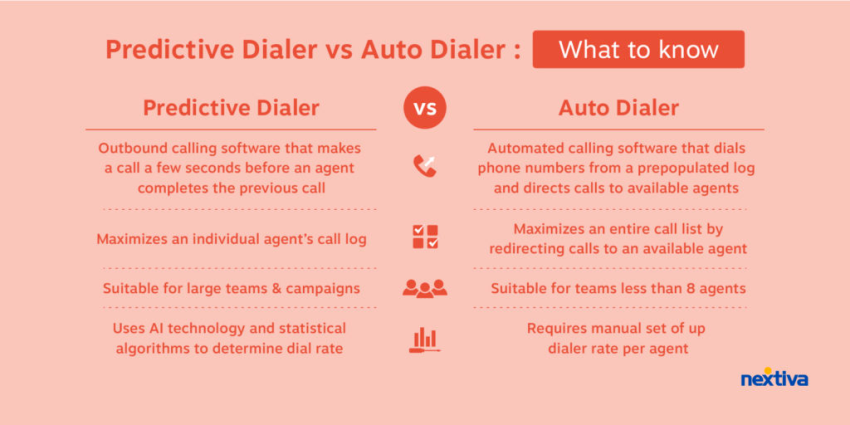
With predictive dialers, algorithms fuel predictions of when an agent will be available for the next call. This triggers the system to dial numbers in advance. This technology helps maximize productivity by minimizing idle time between calls, leading to higher call volumes and potentially increased sales or survey completion rates.
| 👀 In action: A telecommunications company launching a new service might use an outbound call center to contact existing customers in their CRM and inform them about the new offering. |
Blended call center
⭐ Best for: Businesses that must balance inbound customer support and outbound sales or marketing activities.
Blended call centers pull double duty with call activity, handling both incoming and outgoing calls. Blended agents need to be versatile based on call volume and business needs.
Blended call centers balance inbound customer service needs with outbound sales or marketing efforts. They do this by dynamically adjusting staffing based on call volume. They can then allocate resources between inbound and outbound calls in real time.
This flexibility allows companies to maximize agent productivity by ensuring that agents are always engaged in productive call activity — no matter which need is more pressing at the moment.
| 👀In action: A subscription-based software company might use a blended call center to address technical issues and also follow up with customers whose subscriptions are up for renewal. |
Automated call center
⭐ Best for: Businesses with a high volume of routine customer inquiries, such as utility providers or financial institutions.
Automated call centers use cloud-based technology like IVR and intelligent virtual agents to handle customer inquiries or tasks without human intervention.
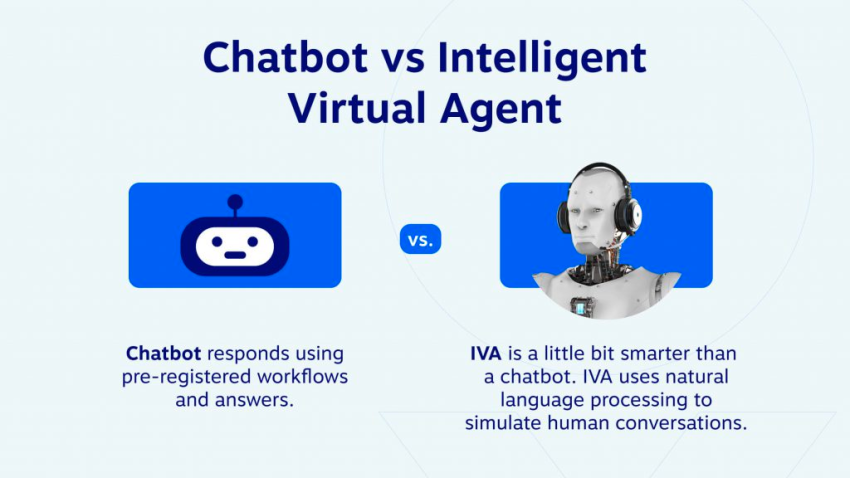
These systems can save time and effort when they:
- Provide information
- Process orders
- Direct callers to the appropriate department
Unlike human agents who can only handle one call at a time, automated systems can take multiple calls concurrently. This provides quick and efficient service to customers and reduces the workload on agents for run-of-the-mill inquiries. These call centers can use auto attendant scripts to create pre-recorded menus to suit various customer needs.
This scalability makes these call centers ideal solutions for businesses that experience fluctuating call volumes or need to process lots of inquiries in a short period.
| 👀 In action: A bank might use an automated call center to provide account balances, find local branches, give daily hours, or process simple transactions over the phone. |
Virtual call center
⭐ Best for: Businesses that want to access a larger pool of potential talent.
Virtual call centers allow agents to work remotely, often from home. Agents connect to the call center’s systems through the internet and handle calls as if they were in a traditional call center.
More than anything else, virtual call centers offer flexibility for both agents and businesses. Agents can work from anywhere if they can access remote work tools, and businesses gain access to a larger pool of potential talent.
By going virtual, businesses can easily scale their phone call center operations up or down based on demand since they’re not constrained by physical office space.
| 👀In action: A travel agency might use a remote call center to hire remote agents who can work from different locations and offer personalized support across multiple time zones. |
Offshore call center
⭐ Best for: Businesses looking to reduce operational costs while maintaining quality customer service.
Offshore call centers are in a different country from the company they serve. These call centers often offer cost savings for companies due to lower labor costs in the offshore location.
However, they can sometimes create challenges related to:
- Language barriers
- Cultural differences
- Time zone changes
Differing time zones can also benefit businesses with a smaller geographical presence. Offshore provides extended hours of operation, allowing companies to offer customer support outside regular business hours.
| 👀 In action: A software company in Sacramento, CA, might use an offshore call center in South Africa to provide multilingual technical support to customers, leveraging the cost savings to pay for a new customer feedback survey. |
Related: How Much Does a Call Center Cost?
Other types
You can also determine whether you need a call center that presides over multiple channels and how integrated you need those channels to be. You can even staff your call center if it fits your business needs.
Check out these other types of call centers and their pros and cons.
| Call Center Type | Call Center Description | Call Center Pros | Call Center Cons |
|---|---|---|---|
| Multichannel Call Center | Interact with customers through various phone, email, chat, and social media channels. | Increase customer flexibility with multiple touchpoint options. | Disjointed experience without integrated channels. |
| Omnichannel Call Center | Integrate communications to offer consistent support across all channels. | Enhance seamless communication experience and shared data. | Not necessary for some businesses. |
| In-house Call Center | Operate internally using the company’s staff and resources. | Benefit from greater control over customer service quality. | Costly to set up and maintain. |
| Outsourced Call Center | Hire third-party service providers that specialize in being a contact center as a service. | Scale business quicker with a less expensive option. | Less direct control over quality and goal alignment. |
Top Call Center Positions Every Team Needs
Whether you end up starting a call center in-house or outsourcing your services, you should plan on a well-rounded staff for the best and most efficient customer service.
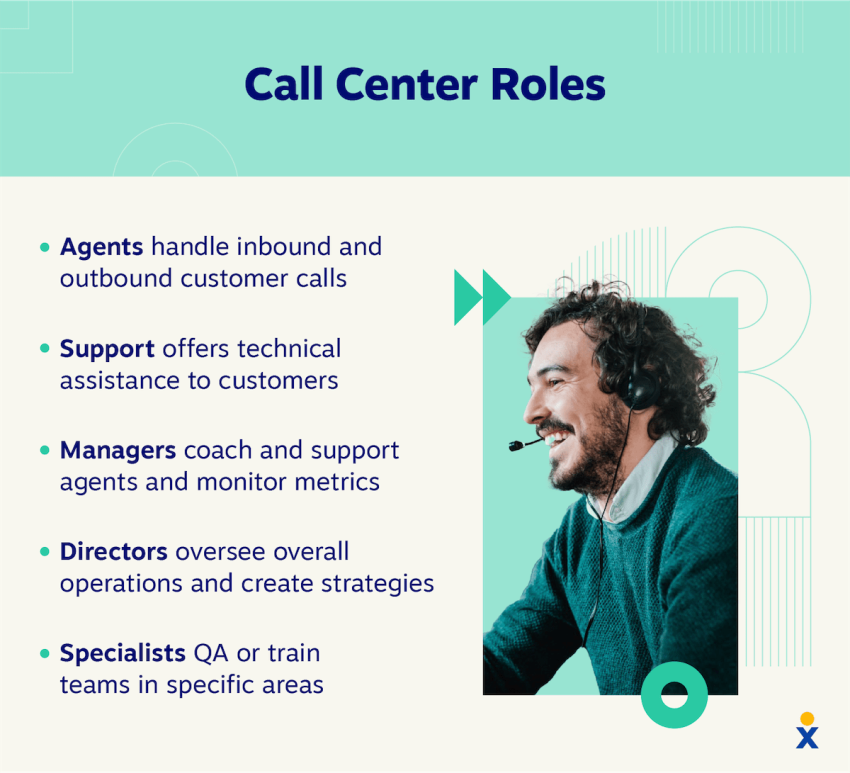
Each call center team needs a variety of different roles to be successful.
- 📞 Agents are the frontline staff who handle incoming and outgoing customer calls. They provide customer service, resolve issues, and answer questions about products or services.
- 🖥️ Support teams are responsible for providing technical assistance to customers. They troubleshoot issues with products and services, give guidance on using internal call center software, and escalate complex issues to higher-level support teams if necessary.
- 📊 Managers are responsible for supervising the day-to-day operations of the call center. They oversee agents and monitor call center metrics, coaching and supporting agents to ensure they hit their goals.
- 📈 Directors are responsible for overseeing the overall operations of the call center. They develop strategies to improve efficiency, manage budgets, hire agents, and ensure positive outcomes from call center teams.
- 🔍 Specialists focus on areas like quality assurance (QA) or training. They might hone in on workforce management or optimize call center performance.
Reasons Why You Might Need a Call Center
Of course, knowing this much about call centers is more helpful when you can understand why you need one.
You might need help with:
- Overseeing a sales team
- Managing customer accounts
- Reducing customer churn
Here are the key signs that your business would benefit from adding call center service:
Your customers spend too much time waiting
Long wait times can lead to customer frustration — a slippery slope to low customer satisfaction. That frustration might drive them to abandon their calls or seek assistance from competitors.
| 🏆 Call centers help manage call volume more effectively, reduce wait times, and improve overall CX. Ensuring customers receive timely support also reduces the risk of churn or lost sales. |
Your customers have complex or high-priority problems
Complex problems often require specialized knowledge and expertise to resolve. High-priority problems like urgent technical issues or escalated complaints need prompt attention.
| 🏆 Call centers help by providing access to trained agents who can handle special cases and prioritizing urgent cases to ensure agents address them promptly. |
Your CX needs a lift
Customers might turn away from you for more convenient competitors if your business lacks sufficient support channels. Even if you have multiple channels, inconsistencies in the level of service across different touchpoints can lead to a poor CX.
Call centers help by providing additional avenues for customers to reach out and receive assistance, as well as standardizing service delivery to ensure interactions are consistent in quality.
Scale Your Customer Service Strategy with Confidence
A call center campaign can significantly enhance business efficiency and boost customer service KPIs. Whether you want to improve sales or streamline operations, a centralized hub for customer interactions can better meet customer needs and drive growth.
Embrace the opportunity to transform your business and exceed expectations with a customer-centric call center solution tailored to your needs.
Related: What to Look for When Choosing a Call Center Provider
The complete call center solution
See why top brands use Nextiva to handle calls at scale. Easy to use. Fast setup.
Call Center FAQs
For more call center basics, check out these frequently asked questions.
Call centers make money through the services they provide to businesses. They might charge a business in several different ways.
The most common pricing structures for call centers are:
Per-minute or per-call pricing, where businesses pay based on the duration of each call or the number of calls handled
Monthly subscription fees that include a certain number of minutes or calls
Revenue sharing with a percentage of the revenue generated from sales or leads generated through the call center
Setup and customization fees for setting up call center services, customizing scripts or software, or providing training
Call centers might also charge for additional services like outbound marketing campaigns, data analysis, or customer surveys.
The difference between a call center vs. a contact center is that a call center only handles calls. Meanwhile, contact centers are centralized offices or remote teams that assist customers on all communication channels.
A blended call center is often the most effective type of call center for B2B businesses. It allows for inbound customer service and outbound sales and lead generation.
Business process outsourcing (BPO) is when a company hires a third party to take over a portion of the business. BPO call centers are outsourced call center teams that serve the business.
Call centers measure success using various KPIs that reflect different parts of their operation, such as:
Service level agreements (SLAs)
Average handle time (AHT)
First call resolution (FCR)
Together, different customer service metrics can help find your ROI on customer experience efforts.
Working in a call center requires technical and soft skills to communicate with customers and handle difficult situations, such as:
Communication
Customer service
Computer literacy
Call center agents are most successful when they combine interpersonal, problem-solving, technical, and communication skills to deliver high-quality customer service.


















 Customer Experience
Customer Experience 












